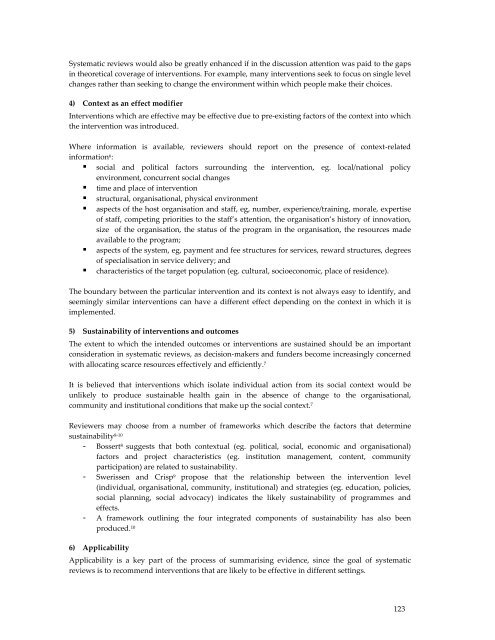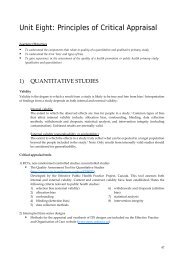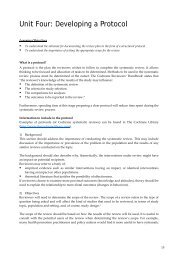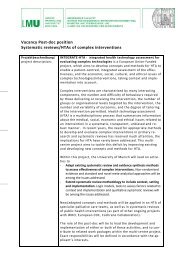Train the Trainer Course book - Cochrane Public Health Group
Train the Trainer Course book - Cochrane Public Health Group
Train the Trainer Course book - Cochrane Public Health Group
Create successful ePaper yourself
Turn your PDF publications into a flip-book with our unique Google optimized e-Paper software.
Systematic reviews would also be greatly enhanced if in <strong>the</strong> discussion attention was paid to <strong>the</strong> gaps<br />
in <strong>the</strong>oretical coverage of interventions. For example, many interventions seek to focus on single level<br />
changes ra<strong>the</strong>r than seeking to change <strong>the</strong> environment within which people make <strong>the</strong>ir choices.<br />
4) Context as an effect modifier<br />
Interventions which are effective may be effective due to pre-existing factors of <strong>the</strong> context into which<br />
<strong>the</strong> intervention was introduced.<br />
Where information is available, reviewers should report on <strong>the</strong> presence of context-related<br />
information 6 :<br />
social and political factors surrounding <strong>the</strong> intervention, eg. local/national policy<br />
environment, concurrent social changes<br />
time and place of intervention<br />
structural, organisational, physical environment<br />
aspects of <strong>the</strong> host organisation and staff, eg, number, experience/training, morale, expertise<br />
of staff, competing priorities to <strong>the</strong> staff’s attention, <strong>the</strong> organisation’s history of innovation,<br />
size of <strong>the</strong> organisation, <strong>the</strong> status of <strong>the</strong> program in <strong>the</strong> organisation, <strong>the</strong> resources made<br />
available to <strong>the</strong> program;<br />
aspects of <strong>the</strong> system, eg, payment and fee structures for services, reward structures, degrees<br />
of specialisation in service delivery; and<br />
characteristics of <strong>the</strong> target population (eg. cultural, socioeconomic, place of residence).<br />
The boundary between <strong>the</strong> particular intervention and its context is not always easy to identify, and<br />
seemingly similar interventions can have a different effect depending on <strong>the</strong> context in which it is<br />
implemented.<br />
5) Sustainability of interventions and outcomes<br />
The extent to which <strong>the</strong> intended outcomes or interventions are sustained should be an important<br />
consideration in systematic reviews, as decision-makers and funders become increasingly concerned<br />
with allocating scarce resources effectively and efficiently. 7<br />
It is believed that interventions which isolate individual action from its social context would be<br />
unlikely to produce sustainable health gain in <strong>the</strong> absence of change to <strong>the</strong> organisational,<br />
community and institutional conditions that make up <strong>the</strong> social context. 7<br />
Reviewers may choose from a number of frameworks which describe <strong>the</strong> factors that determine<br />
sustainability 8-10<br />
- Bossert 8 suggests that both contextual (eg. political, social, economic and organisational)<br />
factors and project characteristics (eg. institution management, content, community<br />
participation) are related to sustainability.<br />
- Swerissen and Crisp 9 propose that <strong>the</strong> relationship between <strong>the</strong> intervention level<br />
(individual, organisational, community, institutional) and strategies (eg. education, policies,<br />
social planning, social advocacy) indicates <strong>the</strong> likely sustainability of programmes and<br />
effects.<br />
- A framework outlining <strong>the</strong> four integrated components of sustainability has also been<br />
produced. 10<br />
6) Applicability<br />
Applicability is a key part of <strong>the</strong> process of summarising evidence, since <strong>the</strong> goal of systematic<br />
reviews is to recommend interventions that are likely to be effective in different settings.<br />
123








